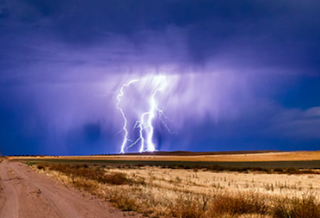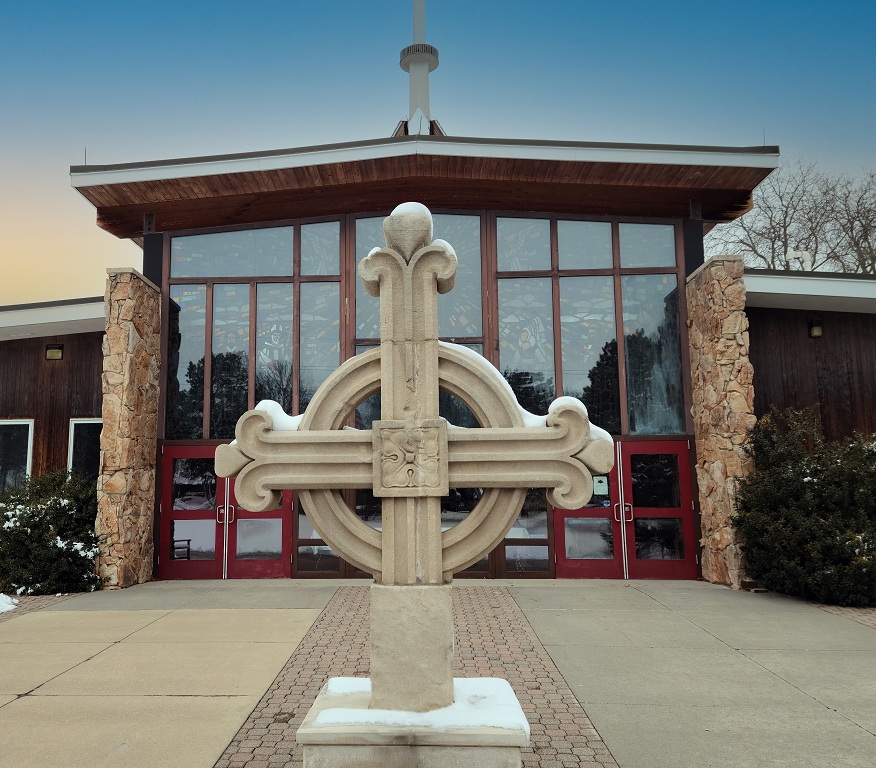Thunderstruck
"And Jesus was astounded at their lack of faith."
When was the last time you were astonished? I mean really astonished? Maybe it will help you answer my question to think about astonishment compared to things like wonder and surprise and amazement. You might wonder about something you don’t quite yet understand, or you might see a wonder of nature while your on vacation. Wonder is not all that far out of the ordinary, really. You are surprised at something you didn’t expect—a birthday party, someone jumping out and yelling “boo!” You are momentarily surprised, and then things are back to normal. You are amazed—your thoughts literally caught in a tangle, a maze, when you see or hear something that just doesn’t make sense. All of those things happen pretty regularly for me…but astonishment? Literally, the root of the word astonishment means thunderstruck—“out of a clap of thunder.” So, when was the last time you were thunderstruck…so shocked by something that came out of the blue that your hair stood on end and your head was spinning?
In the Gospels, there are thirty accounts of people being astonished, being thunderstuck. People are astonished at the Shepherds’ account of the Angel’s message at Jesus’ birth. The disciples were astonished in one of our recent readings when Jesus has power to calm the storm at sea. People are astonished at the Jesus’ wisdom and teaching. The disciples are astonished to see Jesus talking with the Samaritan woman at the well and drinking from her cup. (The disciples are astonished quite a lot about the things Jesus does and says, actually!) Pilate is astonished at Jesus’ silence before him. Peter is astonished when he runs to Jesus’ tomb and finds only the burial wrappings. But Jesus…Jesus is astonished only two times, and both times, Jesus is astonished by people’s faith—or lack of faith.
We heard today about the first time Jesus is astonished: Jesus is astonished at the unbelief of the people in his hometown. The way N.T. Wright translates this is: “Their unbelief dumbfounded him.” This reading today is the end of a three-act story in Mark that has been explaining the nature of Jesus’ Kingly authority—explaining what kind of a King Jesus is. Two weeks ago, in act one, we learned that Jesus is King over creation and nature, when he says, “Peace, be still!” to the raging wind and crashing sea, and suddenly there is calm. Last week, in act two, we learned that Jesus is King of abundant life, and even King over life and death, as the woman in the crowded street is healed just by touching his robe, and he raises the daughter of Jairus to life again. Jesus’ power is truly astonishing. We are thunderstruck, like the disciples, asking, “Who then is this, that even the wind and the sea,” and death itself, “obey him?”
The Son of God…A King with power over everything…it would make a great Marvel movie, with lots of CGI action, as heads get banged and Jesus makes the world and its inhabitants obey his commands and fall in line behind him.
But today, in act three, there is a huge plot twist: The people in Jesus’ hometown, we are told, were astonished at the wisdom and deeds of power and teaching they've heard about from nearby villages—but they get offended at Jesus. You’ll remember in the story four Sundays ago, the crowd thought Jesus had lost his mind, and his mother and brothers tried to come and take him away—perhaps trying to quiet him and save him from today’s outcry, and perhaps trying to save themselves from embarrassment and shame by their neighbors and friends who are so offended. What exactly is it that caused this offense, this uproar?
Mark, who is always working to keep the narrative brief, doesn’t give a clear answer, but the parallel passage in Luke does. Jesus had stood up to read Scripture in his home-town Temple, choosing the passage from Isaiah that says, “The Spirit of the Lord is upon me, because he has anointed me to proclaim good news to the poor. He has sent me to proclaim freedom for the prisoners and recovery of sight for the blind, to set the oppressed free.” This is the message that offended them, this is when they started to question Jesus’ authority and power. Jesus even adds to their resentment by reminding them of specific times in the past when, because of disbelief and disobedience, God’s miracles came not to the people of Israel, but to foreigners. And this is when Jesus is astonished…Jesus is astonished—dumbfounded—by their disbelief—and we’re told he can do no deeds of power among them.
This is the unexpected plot twist: in act three we learn that Jesus, the all-powerful King, the Son of God, will not use his power against the will of his subjects. They are not forced to obey, not forced to believe, not forced to be healed, not forced to accept the abundant life he offers. That day, the same as on a later day on the Cross, Jesus, who could summon a legion of the heavenly army to do his bidding and knock heads and enforce his rule, does not do it.
We should all find this astonishing: the King, who created and controls all, relinquishes control and rules by invitation rather than coercion.
I mentioned at the start that Jesus is astonished only two times in the Gospels. The first time is in this story, in his hometown, astonished by people’s lack of faith and the rejection of his invitation. The second time is later in his ministry, when a pagan, a Roman centurion, sends messengers asking Jesus to come heal his servant. As Jesus was coming up to this soldier’s house, the centurion sent friends to say to him, “Lord, do not trouble yourself, for I am not worthy to have you come under my roof…But only speak the word, and my servant will be healed.” Jesus is astonished, saying, “In all of Israel I have never found anyone with this much faith!” (Luke 7:6-9).
So, when was the last time you were astonished? I invite you this week to be astonished: Be astonished at the meaning of Paul’s words and what they meant for him and what they mean for you and for me today: “God’s grace is sufficient for you, for power is made perfect in weakness.” Jesus does not send out his disciples with swords and mighty armaments and full provisions to do his battles—Jesus sends them out with nothing: no bread, no bag, no money, not even an extra t-shirt for the road. And when they encounter antagonists, those who refuse to hear the message of release for prisoners and sight for the blind and freedom for the oppressed, there is no lightning from heaven for the disciples to smite with—just the shaking of dust from their feet and walking on to try the next place.
I invite you to be astonished that the Son of God chose not to dine not with the Emperor, but with prostitutes and sinners. I invite you to be astonished that the infinite power of the One through whom all things were made and in whom we live and move and have our being is demonstrated by saying “love your enemies” and by dying a humiliating death on a Cross. I invite you to be astonished at Jesus’ giving his liberating message of freedom and release and healing and abundance.
My prayer this week is that Jesus will again be astonished, astonished at our faith—not as he was with the closed minds and hardened hearts and faithless people in his hometown, but as he was with the humble and faithful Centurion. May Jesus be astonished at our faith, and then may he send us out as he did those first disciples, with everything we need: with just with his message of invitation to abundant life and His promise of God’s forgiving love.




Comments
Post a Comment